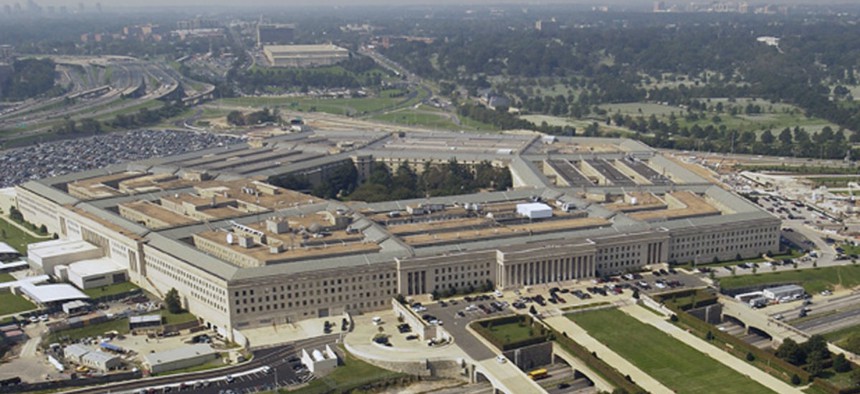
Defense Department file photo
Union Urges Congress to Make Pentagon Quantify Services Contracting
AFGE says too many dollars are “diverted” to Defense headquarters awards.
The American Federation of Government Employees is asking Congress to step in and require the Defense Department to “improve the oversight and management for the vast sums it spends so carelessly on contracted services,” its president said in a late-April letter to congressional chairmen.
“Anything less is handing a blank check to the Pentagon to waste [money] on contracted services," wrote national president J. David Cox in a letter urging that Congress require implementation of Government Accountability Office recommendations that would establish more detailed long-term projections in spending on such services as information technology, research and development, and facilities maintenance.
“This action is needed to ensure that funds are properly allocated to the readiness and recapitalization priorities of the Department of Defense and not diverted to headquarters contracts,” Cox said.
GAO in a February 2016 report estimated Defense contract spending in fiscal 2014 at $85 billion for the largest three types of services—more than twice the spending on air, land and sea vehicles. Auditors urged the Pentagon to improve forecasting of services contracting costs in its budget submissions by complying with statutory requirements and developing a new “program objective memorandum” that identifies needs both in the current and the next four fiscal years.
Cox also criticized the accuracy of testimony given in March to a House Oversight panel hearing on waste at the Defense Department by David Tillotson III, the Pentagon’s acting deputy chief management officer, who touted savings of $1.9 billion over the next five years through Service Requirements Review Boards. Those bodies aim to validate and streamline contracts by requiring DoD components to review their service requirements and “find opportunities for efficiency by eliminating non-value-added services and duplicative requirements, better aligning requirements to mission, and using strategic sourcing opportunities.”
Cox argued that those boards focus “more on acquisition strategy in the year of execution and are not the right venue for competing and prioritizing contracting requirements against other requirements or for preventing duplication.” Too often, the rerouting of contracts forces furloughs on the civilian workforce, the union said.
An AFGE spokesman told Government Executive that “we have obtained some bipartisan member support from the relevant committees” but that it is too early to predict progress. The Pentagon had partially concurred with GAO’s recommendations and had begun pilot projects in broadening the program objective memoranda. But officials also said projections are complicated by the “volatility” of budget cycles.
A former Pentagon executive told Government Executive that past experience has shown that the Service Requirements Review Boards are “a good idea. DoD accounting systems do not track service contracts separately--it would be very difficult to do so because they are spread throughout almost every account,” the former official said. “The department does make estimates of contract spending and, as I recall, those estimates showed some decline in contract spending.” Regular reviews, the official added, can help to “prune selectively.”
Alan Chvotkin, executive vice president and counsel of the 400-member Professional Services Council, called the Cox letter wrong on facts, wrong on conclusions and wrong on its recommendations. “Congress has been very aggressive in oversight of service contacts,” he said. “Each of last three National Defense Authorization Acts had provisions constraining spending on services contracts,” and the fiscal 2017 version put limits on staff growth in DoD headquarters.
“There’s lots of transparency in the spend, in the annual budget, in object classification around services spending, and all of the actual spend on services is recorded,” Chvotkin said. He agreed with the GAO recommendation to aim for better long-term projections. “But the nature of the spend is difficult to project where you’re going to need that spending, in IT or services for major weapons systems. It is there, I believe, but you have to work a little harder to find it.”
Chvotkin said AFGE appears to assume a direct relationship between having more contractors and fewer government employees. “The two are unrelated, in my view,” he said. “We want a strong government workforce that is well paid. But a workforce is not going to provide cybersecurity, cloud services, or engineering support, most of which have never been nor are able to be performed by government employees.”
NEXT STORY: Why Won't Susan Rice Testify to Congress?







